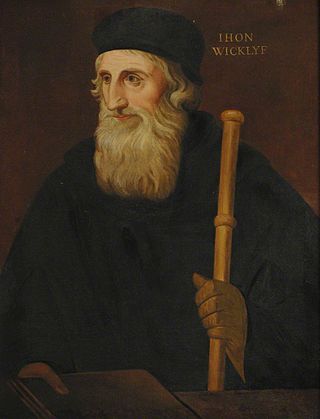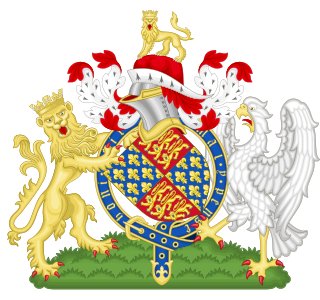
John Wycliffe was an English scholastic philosopher, theologian, biblical translator, reformer, Catholic priest, and a seminary professor at the University of Oxford. He became an influential dissident within the Catholic priesthood during the 14th century and is considered an important predecessor to Protestantism. Wycliffe questioned the privileged status of the clergy, who had bolstered their powerful role in England, and advocated radical poverty of the clergy.

Lollardy, also known as Lollardism or the Lollard movement, was a proto-Protestant Christian religious movement that was active in England from the mid-14th century until the 16th-century English Reformation. It was initially led by John Wycliffe, a Catholic theologian who was dismissed from the University of Oxford in 1381 for criticism of the Roman Catholic Church. The Lollards' demands were primarily for reform of Western Christianity. They formulated their beliefs in the Twelve Conclusions of the Lollards.
Year 1401 (MCDI) was a common year starting on Saturday of the Julian calendar.

Thomas Arundel was an English clergyman who served as Lord Chancellor and Archbishop of York during the reign of Richard II, as well as Archbishop of Canterbury in 1397 and from 1399 until his death, an outspoken opponent of the Lollards. He was instrumental in the usurpation of Richard by his cousin Henry Bolingbroke, who became Henry IV.

Sir John Oldcastle was an English Lollard leader. From 1409 to 1413, he was summoned to parliament as Baron Cobham, in the right of his wife.
John Purvey was an English theologian, reformer, and disciple of John Wycliffe. He was born around 1354 in Lathbury, near Newport Pagnell in the county of Buckinghamshire, England. He was a great scholar, permitted to enter all priestly ranks on 13 March 1377, or 1378. It has been assumed by scholars that Purvey became acquainted with Wycliffe's ideas in Oxford. In around 1382, Purvey lived with Wycliffe at Lutterworth, Leicestershire, along with Nicholas of Hereford and John Aston, and became one of Wycliffe's disciples.

Wycliffe's Bible or Wycliffite Bibles or Wycliffian Bibles (WYC) are names given for a sequence of Middle English Bible translations believed to have been made under the direction or instigation of English theologian John Wycliffe of the University of Oxford. They are the earliest known literal translations of the entire Bible into English. They appeared over a period from approximately 1382 to 1395.

De heretico comburendo or the Suppression of Heresy Act 1400 was a law passed by Parliament under King Henry IV of England in 1401 for the suppression of the Lollards. It punished seditious heretics with burning at the stake. This law was one of the strictest religious censorship statutes ever enacted in England, affecting preaching and possession of Lollard literature.
The Twelve Conclusions of the Lollards is a Middle English religious text containing statements by leaders of the English medieval movement, the Lollards, inspired by teachings of John Wycliffe. The Conclusions were written in 1395. The text was presented to the Parliament of England and nailed to the doors of Westminster Abbey and St Paul's Cathedral as a placard. The manifesto suggests the expanded treatise Thirty-Seven Conclusions for those that wished more in-depth information.

Thomas Harding was a sixteenth-century English religious dissident who, while waiting to be burnt at the stake as a Lollard in 1532, was struck on the head by a spectator with one of the pieces of firewood, which killed him instantly.

In November 1554, the Revival of the Heresy Acts revived three former Acts against heresy; the letters patent of 1382 of King Richard II, an Act of 1401 of King Henry IV, and the Suppression of Heresy Act 1414 of King Henry V. All three of these laws had been repealed under King Henry VIII and King Edward VI.

Henry le Despenser was an English nobleman and Bishop of Norwich whose reputation as the 'Fighting Bishop' was gained for his part in suppressing the Peasants' Revolt in East Anglia and in defeating the peasants at the Battle of North Walsham in the summer of 1381.
Events from the 1400s in England.
Henry Crumpe (fl.1380–1401) was Anglo-Irish Cistercian.
The ex officio oath developed in the first half of the 17th century, and was used as a form of coercion, persecution, and forcible self-incrimination in the religious trials of that era. It took the form of a religious oath made by the accused prior to questioning by the Star Chamber, to answer truthfully all questions that might be asked. It gave rise to what became known as the cruel trilemma where the accused would find themselves trapped between a breach of religious oath, contempt of court for silence, or self-incrimination. The name derives from the questioner putting the accused on oath ex officio, meaning by virtue of his office or position.

The Ecclesiae Regimen, also Remonstrance, xxxvii Conclusiones Lollardorum, or Thirty Seven Articles against Corruptions in the Church, is a church reformation declaration against the Catholic Church of England in the Late Middle Ages. It had no official title given to it when written and the author(s) did not identify themselves in the original manuscript. This public declaration by the English medieval sect called the Lollards was announced to the English parliament at the end of the manifesto Twelve Conclusions of the Lollards published in 1395.
Margery Baxter was an outspoken and heretical Lollard from Martham, England. She was brought to trial twice and flogged at church.

The Oldcastle Revolt was a Lollard uprising directed against the Catholic Church and the English king, Henry V. The revolt was led by John Oldcastle, taking place on the night of 9/10 January 1414. The rebellion was crushed following a decisive battle on St. Giles's Fields.

Dives and Pauper is a 15th-century commentary and exposition on the Ten Commandments written in dialogue form. Written in Middle English, while the identity of the author is unknown, the text is speculated to have been authored by a Franciscan friar. Dives and Pauper is structured as a dialogue between two interlocutors, a wealthy layman (Dives) and a spiritual poor man with many similarities to a friar (Pauper). The text engages with orthodox Catholic theology, and further discusses many questions relevant to Wycliffism, an English movement which criticised doctrines and abuses of the Church, which was condemned as heretical by church authorities.
John Resby was an English priest and supporter of John Wycliffe. He was executed by burning for heresy in Perth, Scotland, in 1407 or 1408, during the time when Henry Wardlaw was Bishop of St. Andrews. He is regarded as the first Protestant martyr in Scotland.











